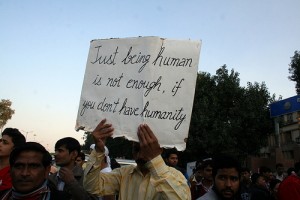in brief : four men convicted in delhi gang rape case

(Image via Flickr)
Four men have been convicted in New Delhi over the gang rape and murder of a 23 year old physiotherapy student onboard a moving bus in December last year. The victim was viciously assaulted by the group for an hour before being thrown from the bus along with a male friend she was with. She died in a Singapore hospital nearly two weeks later. The men will be sentenced on Friday, with prosecutors advocating the death penalty for the crime that shocked India and brought international attention to the scale of rape and violence perpetrated against women in the country
The mother of the murdered woman told The Indian Express newspaper that ‘justice will be done in the true sense only if all of them are hanged’. The four men, Mukesh Singh, Akshay Thakur, Pawan Gupta and Vinay Sharma, all pleaded not guilty to charges that included rape, murder, and theft. Lawyers for three of the men said they will appeal the convictions.
Two others were also involved in the crime. Ram Singh, the alleged ring leader of the attack was found dead in police custody in March. His death was ruled a suicide, but his family claimed he was murdered. The sixth accused was convicted on Saturday for his part in the crime. Because of his age at the time of the murder, he was sentenced to three years in a juvenile facility. That decision drew criticism from the victim’s family, but was the maximum sentence allowable under the law for an under-aged offender.
The horrific brutality of the crime led to unprecedented public interest in the case and sparked an ongoing national debate in India about violence against women. New legislation was introduced in March in response to the public outcry following this case which would allow the death penalty to be given in the most serious rape cases. Public protests and street demonstrations have been common across India since the beginning of this year and there is increasing focus from ordinary citizens, politicians, and other public figures on the situation of women in the country. Whilst attention has largely centred on this particular attack, activists are trying to highlight the wider problems in Indian society that contribute to high levels of violence, rape, and harassment against women.
According to India’s National Crime Record Bureau (NCRB), violent crimes against women rose 6.8% in 2012 over the preceding year. The number of reported rapes rose by 2.96%, whilst kidnappings and abductions of women and girls increased by 7.5% in the same period. Most shocking is a rise of 55% in the number of cases involving the rape of children. Whilst these are official statistics, the actual figures are almost certainly higher due to the significant stigma surrounding the reporting of rape.
Many Indians have pointed to the problems inherent in trying to balance entrenched social and cultural attitudes with a rapidly modernising economy. Novelist and journalist, Nilanjana Roy, argues that ‘“rape culture” in India is fuelled by an acceptance of inequality and of embedded violence’. In particular she acknowledges the social ‘fault lines – of caste, class and gender’ that she feels contribute to the normalisation of violence against women.
The issue of marriage dowries is particularly pertinent in this regard. Despite it being illegal to request, pay, or accept a dowry under Indian law, the traditional practice is still widespread and is prevalent around India and across varying socio-economic groups. According to NCRB statistics, one woman dies every hour, either by murder or suicide, as a result of disputes over dowry payments.
The December 2012 gang rape shook India, but it has started a crucial national debate on the prevalence of rape and more broadly on a culture and society that excuses, encourages, ignores and otherwise supports violence against women.

